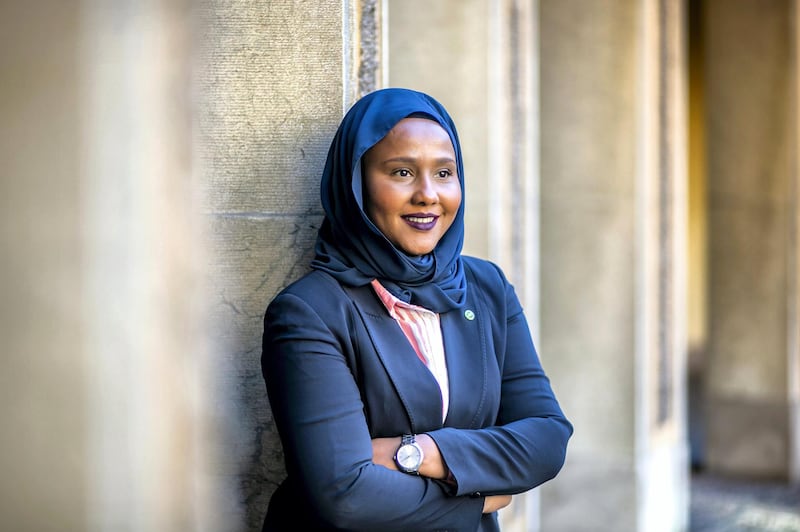After Leila Ali Elmi was elected to be Sweden’s first hijab-wearing member of parliament last year, local media referred to her as "the hidden one".
The 31-year-old was described as rising from obscurity but she says the media never “looks for good in the suburbs” where she had already served on the local council.
But the areas are heavily populated by migrants and are notoriously segregated
While the country is known as a bastion of gender equality, social justice, and for taking in refugees, the picture is not always as rosy for the 16 per cent of Swedes who were born abroad.
Unemployment is more than five-times higher for them than it is for those born in Sweden, and like much of Europe, liberal, tolerant Sweden has been facing a right-wing populist surge.
Ms Elmi was elected for the Green Party against a backdrop of rising anti-Muslim sentiment and a wave of mosque attacks. She canvassed for support on the streets of her hometown of Angared, an isolated suburb of Gothenburg sometimes described as a ghetto, where she was a councillor.
"Sweden was built on immigrants. Nobody is going anywhere and we need to show the far right that this country is ours too, and not back down," she told The National at the Green Party parliamentary offices in Stockholm.
For her, the best antidote to extreme nationalism, racism and nativist ideology is to not stay hidden but to be vocal, and to be herself.
“This is a norm breaking process we’re going through,” she said.
“I want other people who are minorities, people who feel disregarded because of who they are, who they chose to be or what they were born to be, to see that there are people fighting for human rights, liberty and for democracy.”
Born in Ethiopia to Somali parents, Ms Elmi arrived in Sweden as a refugee as a one-year-old and considers life here the only one that she knows, although she is proud of her culture and heritage.
She is Sweden's first East African woman MP and joins a growing number in the Somali diaspora to have taken up political posts across the world. In the US Ilhan Omar recently became the first hijab-wearing member of Congress, while last year the UK's Magid Magid was appointed Sheffield's youngest Lord Mayor.
Ms Elmi began wearing a hijab two years ago as, for her, it was “helpful to have a connection to divinity” although she accepts that being a “minority in every way” may make things tough for her.
“You have to have someone to talk to and rather than talk to a therapist I chose to talk to God,” she joked.
Her inspiration to fight for what she believes in comes from classical pianist turned jazz musician, and civil rights activist, Nina Simone. And in a letter she remembers fondly, a supporter told her she has the strength of Pippy Longstocking. The red-headed kid with superhuman strength and resilience who stands up to bullies – a creation of Swedish author Astrid Lindgren – is a national symbol for feminism as she encourages girls to believe in themselves.
“I know it’s tough, I know it’s hard, I know I’ll go through more s**t than most other MPs, but I think it’s necessary for me to be here. Racism and race are social constructions and if people are not on the inside paving the way for change then we will never get anywhere – being a first at something comes with a duty,” said Ms Elmi.
“It’s not even about Sweden, it’s bigger than me.”
One of her proposals – which has received a mixed reception and was recently misrepresented by Russian state media – is a voluntary, self-identified and anonymous register to collect data on race, religion and other factors.
The idea is that it will help to better understand the effect discrimination has on factors such as wages, when at present the country only collates data on discrimination based on age and gender.
But as a member of the Green Party, she is also dedicated to efforts to preserve the environment and believes strongly in collective responsibility.
The far-right, she says, “have changed the course of debate, but it has to go back to social equality and social sustainability. Their debate focuses on immigration, on racism, on all of these things that are actually not the problem. If you want to reach social justice, you have to start at climate justice and how we share the resources of this planet.”
In many ways, Sweden exemplifies the thornier issues of the migration debate.
Sweden is among the countries where refugees find it hardest to assimilate due to cultural isolation. It also has one of the highest numbers of ISIS fighters as a percentage of its Muslim population. But during the migrant crisis, it also took in the highest number of refugees per capita of any European Union member state. In 2015, at the height of the crisis, Sweden — a country of 10 million — received 160,000 asylum seekers.
Last year, the United Nations said it was “concerned” about the level of racism in the country. In 2014, Sweden experienced a series of three arson attacks on mosques in one week, and according to one report, there were over 40 attacks on mosques or Muslim assemblies in 2017.
Although Sweden has shifted towards the far right, it has far from embraced it. The anti-immigration Sweden Democrats did not get the support they had expected at a general election in September. As a result, the vote produced a hung parliament and the country was stuck in a four-month-long political deadlock.
Neither the centre-right nor the centre-left blocs that dominate Swedish politics were able to form a new government as both refused to co-operate with the Sweden Democrats. An agreement was eventually reached to govern without them following marathon negotiations.
Even from this political wrangling Ms Elmi finds cause for optimism.
For her, Sweden’s future is bright. “The left and right parties came together to say no to racism and I believe that,” she said.








